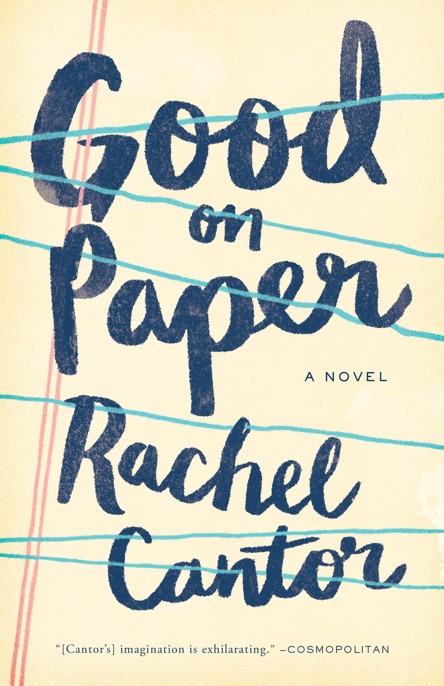
Good on Paper
کتاب های مرتبط
- اطلاعات
- نقد و بررسی
- دیدگاه کاربران
نقد و بررسی

Starred review from October 19, 2015
Shira Greene is working as an office temp and living with her daughter, Andi, and Ahmad, her best friend, when she gets a life-changing telegram: Romei, the mysterious winner of the Nobel Prize for Literature, wants her to translate his latest, a work of poetry and prose based on Dante’s La Vita Nuova (literally “new life”), the same work that Shira was translating when she abandoned her Ph.D. At first, Shira thinks that someone is playing a joke, but she’s happy to have a second chance at her career; she even begins to imagine love with the eccentric part-time rabbi and owner of the neighborhood bookstore that publishes Gilgul, the literary journal where one of Rachel’s stories caught Romei’s eye. Cantor’s follow-up to 2014’s A Highly Unlikely Scenario (which PW starred) starts light and shimmers with humorous touches, but as Romei’s faxed pages begin arriving, Shira panics, fearing the work is not only untranslatable but designed to break her. Translation is a metaphor through which Cantor uses her considerable powers with language to refract larger questions about family bonds, storytelling, and letting go of fantasies of new life and waking up to the life that is yours.

Starred review from October 1, 2015
A translator struggles to redefine her work, her family, and her sense of self. Translation, done well, is less an act of comprehension than one of empathy]the translator must enter the writer's head and decipher not only her words, but her intention. In Cantor's (A Highly Unlikely Scenario, 2014) skillfully structured second novel, dilettante temp and single mom Shira Greene approaches translation work in stages: first she retypes, then she handwrites, scans for rhythm, takes notes, builds a lexicon, and ultimately throws the draft away before starting "the real business of translation, trusting that everything I'd noted had sunk into my cells." Shira handles her relationships in a similarly convoluted way, dancing around and into them in bursts before stepping back to take stock. This tends to cause a fair amount of chaos, especially for her young daughter, Andi, and her old friend and surrogate co-parent, Ahmad, whose home they share. When Shira gets a telegram from a Nobel-winning poet about what seems like a dream translation project, she dives in despite the strangeness and reticence of the author. As his manuscript trickles in via fax, each section more impossible than the last, Shira's personal life becomes just as tangled: Andi, feeling neglected, starts to act out; Ahmad, critical of Shira's laissez faire parenting, threatens drastic measures; and Benny, a charmingly flawed rabbi and bookstore owner, seduces and rejects her in turns while hiding his own Noah-worthy flood of secrets. It's a lot to absorb, but don't hesitate to try]Cantor clearly loves her characters, and she shows true mastery of their inner lives. Between endearingly wonky riffs about translation, she offers full access to Shira's roller coaster of emotions, the collisions of her past and present, and keeps us hanging on through every curve. You'll want to reread the final chapters more than once, delighted anew each time by how well Cantor speaks our language. In this feat of a novel, knowledge is a tiny first step on the way to understanding.
COPYRIGHT(2015) Kirkus Reviews, ALL RIGHTS RESERVED.

October 1, 2015
Shira Greene has been asked to translate a new book by Romei, a Nobel Prize-winning poet. Shira, who walked away from her PhD dissertation on Dante's Vita Nuova, published a few short stories in a small literary magazine, and works for a temp agency, has no idea why she has been approached by Romei. Once the poet begins faxing Shira his work, the situation becomes more confusing. Despite her knowledge of Italian, Shira is unsure how to translate this untranslatable work of literature. In addition, her personal life is getting uncomfortably shaky as she begins a romance with Benny, the neighborhood bookstore owner, and argues with Ahmed, her longtime friend and roommate who serves as the surrogate father for Shira's daughter, Andi. VERDICT In Cantor's second novel (after A Highly Unlikely Scenario) nothing is straightforward--neither the work Shira is translating, nor her private affairs, nor her family history. Yet as the tragedies and comedies of her experiences begin to blend in with Romei's book, the possibility of a vita nuova (new life) for herself and her daughter as well as friend Ahmed and new love Benny seems real.--Andrea Kempf, formerly with Johnson Cty. Community Coll. Lib., Overland Park, KS
Copyright 2015 Library Journal, LLC Used with permission.

November 15, 2015
A rising star in academia, Shira Greene was on her way to a PhD with a dissertation on Dante's Vita Nuova when she unexpectedly became pregnant while traveling in India. Ten years later, she is a single mom living with her daughter, Andi, at the home of Shira's childhood friend, Ahmad, and working a series of uninspiring temp jobs in New York City. Then a call comes in that could turn her life around. Romei, a Nobel Prizewinning poet and author, chooses her to translate his newest work from Italian. Shira envisions big commissions, new writing opportunities, and the chance to restart her faltered career. The idea sounds good on paper, anyway. Unfortunately, the work Romei sends seems to vaguely resemble her own meager writing and her own life; it even seems to mirror Dante's themes. Is this some elaborate game? Shira spends so much time researching the translation, she begins to neglect her family. While Cantor's (A Highly Unlikely Scenario; or, A Neetsa Pizza Employee's Guide to Saving the World, 2014) frequent Dante references can be befuddling at times, the mystery and meaning of Romei's unconventional tale keep the reader turning pages.(Reprinted with permission of Booklist, copyright 2015, American Library Association.)

























دیدگاه کاربران